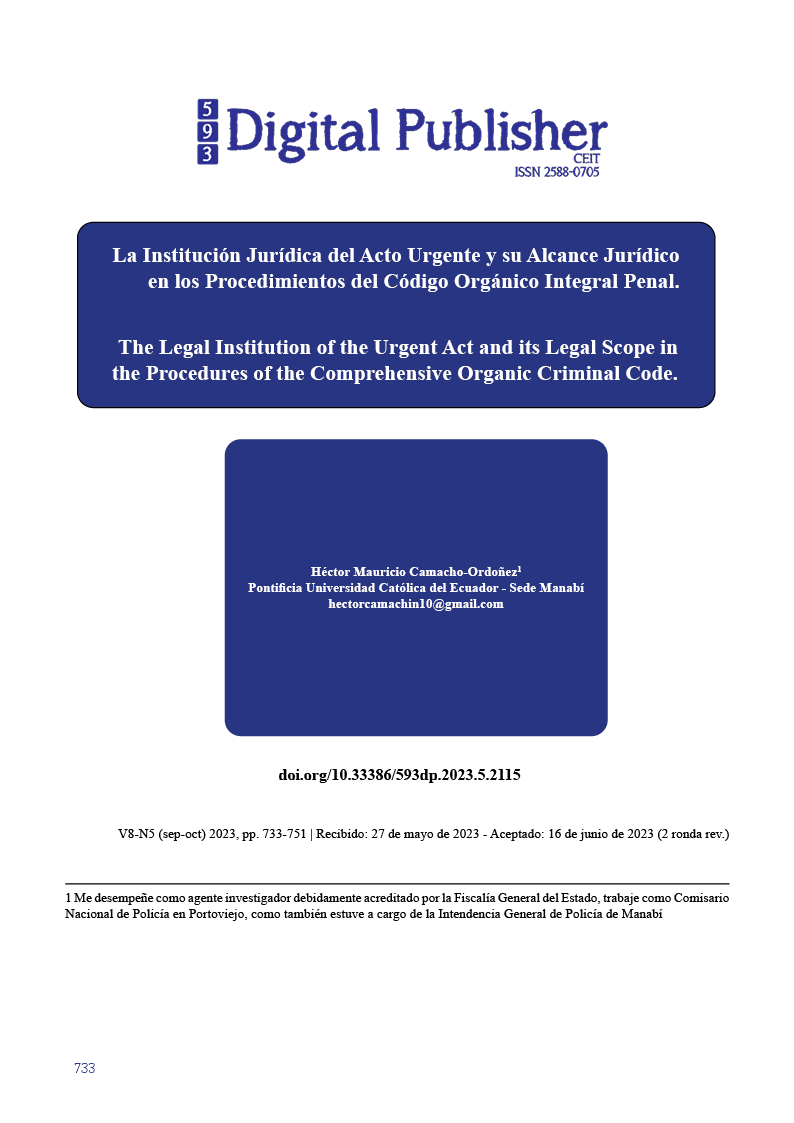The Legal Institution of the Urgent Act and its Legal Scope in the Procedures of the Comprehensive Organic Criminal Code.
Main Article Content
Abstract
Criminal law governs the use of the State's punitive and preventive powers. Its objective is not only to punish actions that cause any damage to legal property, but also to contain and restrict that power, maintaining the hegemony of a constitutionally just and rights-respecting State. The urgent need to consolidate the current punitive legislation, which was previously dispersed in the Ecuadorian legal system and whose primary requirement is reflected in the security of the legal system, in a single text gave rise to the Organic Integral Criminal Code (COIP). The purpose of this study is to analyze the Legal Institution of the Urgent Act and its legal scope in the procedures of the Organic Integral Criminal Code. The methodology applied was the judicial exegetics consisting of the documentary bibliographic review, as a technique the bibliographic file was applied with which the bibliometric analysis could be carried out for the respective analysis. In conclusion, it must be concluded that in the urgent act the provisions of the COIP are aimed at protecting human rights, while at the same time working to restrict them; They also consist of guaranteeing victims’ comprehensive reparation and maintaining the proportionality of the penalty. Consequently, the criminal justice system needs to be updated theoretically and conceptually to better support regional and global social development processes. This includes constantly evaluating concepts such as: minimum criminal intervention, opportunity, favorability, and other legal concepts such as the imprescriptibility of certain crimes, penalties for legal persons and conditional suspension of sentence, among other issues.
Downloads
Article Details

This work is licensed under a Creative Commons Attribution-NonCommercial-ShareAlike 4.0 International License.
1. Derechos de autor
Las obras que se publican en 593 Digital Publisher CEIT están sujetas a los siguientes términos:
1.1. 593 Digital Publisher CEIT, conserva los derechos patrimoniales (copyright) de las obras publicadas, favorece y permite la reutilización de las mismas bajo la licencia Licencia Creative Commons 4.0 de Reconocimiento-NoComercial-CompartirIgual 4.0, por lo cual se pueden copiar, usar, difundir, transmitir y exponer públicamente, siempre que:
1.1.a. Se cite la autoría y fuente original de su publicación (revista, editorial, URL).
1.1.b. No se usen para fines comerciales u onerosos.
1.1.c. Se mencione la existencia y especificaciones de esta licencia de uso.
References
Araujo Granda, P. (2014). De disidentes a delincuentes. Plan V.
Asamblea Constituyente del Ecuador. (2008). Constitución de la República del Ecuador. Registro Oficial N° 449, 1–167.
Asamblea Nacional del Ecuador. (2014). Código Orgánico Integral Penal. In Registro Oficial Suplemento N° 180.
Avella Franco, P. O. (2007). Programa metodológico en el sistema penal (Primera). Imprenta Nacional de Colombia.
Benavides Benalcázar, M. M. (2017). La aplicación del principio de oportunidad como mecanismo de política criminal en la administración de justicia penal en Ecuador. In Universidad Compluense de Madrid. https://docplayer.es/77540368-Tesis-doctoral-tesis-doctoral.html
Bohorques, D. (2016). Rol del Derecho Penal frente al ejercicio del poder punitivo del estado: Caso venezolano. (Tesis de Grado). Universidad de Carabobo. Venezuela. Referido de: http://mriuc.bc.uc.edu.ve/bitstream/handle/123456789/4511/dbohorques.pdf?sequence=1
Cabanellas de Torres, G. (2006). Diccionario Jurídico Elemental. www.librosderechoperu.blogspot.com
Carrión, F. (2017). La política en la violencia y lo político de la seguridad. In Works.Bepress.Com. https://bit.ly/3RBMDoE
Chavez Peña, E. M. (2013). La Acción Penal Privada y su implementación en Colombia. Via Iuris, 14, 167–185. https://revistas.libertadores.edu.co/index.php/ViaIuris/article/view/120
Escobar, J. Á., & Vallejo Montoya, N. (2013). La motivación de la setencia.
Manchado Garabito, R., Tamames Gómez, S., López González, M., Mohedano Macías, L., D´Agostino, M., & Veiga de Cabo, J. (2009). Revisiones Sistemáticas Exploratorias. Medicina y Seguridad Del Trabajo, 55(216), 12–19. https://doi.org/10.4321/s0465-546x2009000300002
Maza López, Á. (2020). Procedimiento Abreviado. Derecho Ecuador. https://derechoecuador.com/procedimiento-abreviado/
Murillo Loján, D. A. (2015). La regulación de las actuaciones fiscales urgentes en el Código Integral Penal frente a los Derechos Constitucionales de las personas.
Neira, A. M., Alvear, E. J., Bueno de Mata, F., & Cruz, A. (2022). Derecho procesal penal: aspectos probatorios. In Serie Fortalecimiento Institucional. Universidad Espíritu Santo. https://uees.edu.ec/wp-content/uploads/2022/05/DerechoProcesalPenalAspectosProbatorios.pdf
Nikken, P. (2010). La protección de los derechos humanos: haciendo efectiva la progresividad de los derechos económicos, sociales y culturales. Revista IIDH, 59, 52.
Ossorio, M. (2006). Diccionario de Ciencias Jurídicas Políticas y Sociales. Editorial Datascan. Guatemala.
Paredes Intriago, K. V. (2022). La motivación constitucional en los decretos ejecutivos dictados en estado de excepción por calamidad pública 2020 – 2021. Ciencia Latina Revista Científica Multidisciplinar, 6(2), 2020–2042. https://doi.org/10.37811/cl_rcm.v6i2.2008
Rodriguez, M. (2013). Sistema acusatorio penal y principio de obliatoriedad de la acción penal. Revista de Derecho Pontificia Universidad Catolica de Valparaiso. Referida de: https://scielo.conicyt.cl/pdf/rdpucv/n40/a20.pdf
Sánchez Gómara, A. (2022). El derecho a un proceso sin dilaciones indebidas. https://doi.org/10.2307/j.ctv2k0582h.14
Sanchez, F. (2012). La teoria Concursal en la Pretension Punitiva. Fiscalia Española. Referido de: https://www.fiscal.es/fiscal/PA_WebApp_SGNTJ_NFIS/descarga/PonePone%20escrita%20de%20D.%20Francisco%20Ram%C3%B3n%20S%C3%A1nchez%20Melgarejo.pdf?idFile=231b7fbe-0127-4a93-a5fe-c402fde0ad71
Valencia Villa, H. (2003). Diccionario Espasa Derechos Humanos. https://doi.org/9788467011098
Vega García, A. (1990). La cláusula «extraordinaria y urgente necesidad» del Decreto-Ley en la jurisprudencia constitucional española. Revista de Estudios Politicos, 68(Abril-Junio), 251–281.
Villagomez Cabezas, R. (2008). El rol del fiscal en el procedimiento penal abreviado.
Vivar, J. C. (2021). Derecho a la libertad en detenciones con fines investigativos / Formulación de cargos.


